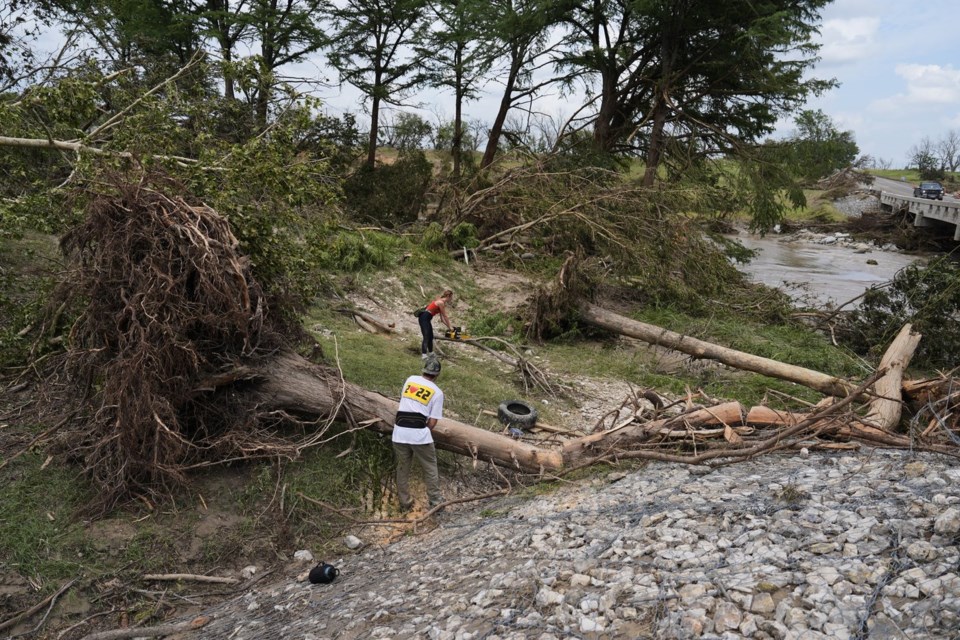Death and destruction at a venerable Texas summer camp might have parents wondering about the risks of sending their kids away to any camp, even if it’s in a much different setting and less vulnerable to a natural disaster.

Death and destruction at a venerable Texas summer camp might have parents wondering about the risks of sending their kids away to any camp, even if it’s in a much different setting and less vulnerable to a natural disaster.
The stunning flood thatkilled more than two dozen campersand counselors along a river at Camp Mystic in the Texas Hill Country was the result of extraordinary rain and walls of water. Nonetheless, experts agree that information about how a camp plans for emergencies is just as important as the lunch menu and the times to go swimming.
Many summer camps, of course, are based around woods and water. Kids often stay in rustic cabins with bunk beds and no electricity, all part of the charm of being away from home, maybe for the first time.
The American Camp Association,which accredits campsand has thousands of members, said parents may want to ask how a camp stays in touch with local emergency service teams. Two people with longtime connections to camps also offered suggestions about what families should be thinking about.
What should parents ask about camp safety?
In Michigan, Jim Austin, 69, has been around summer camps for decades, as a camper, staff member and grandparent seeing his grandchildren off again to Camp Hayo-Went-Ha on Torch Lake, founded in 1904. He said parents should ask how a camp handles any emergency, even an active shooter.
“Do they have a buddy check in the swimming area? Do they have a procedure when somebody is missing? Do they have things in place for severe weather?” Austin said. “If you’re in Florida, you’re looking at hurricanes. Anywhere in the Midwest, you’re looking at a tornado, even thunderstorms.
“If they have to make it up,” he added, “that’s a big red flag.”
Mike Deen, who operates Camp Ao-Wa-Kiya in Michigan’s Oceana County, faced a crisis a year ago when part of atree fell and destroyed a cabinwith more than a dozen people, mostly girls, in the middle of the night. An adult was trapped in her bed for 90 minutes. Any injuries were minor.
“Our policies worked. Personnel were on hand very, very quickly,” Deen said. “Parents should ask a camp: What’s your relationship with local emergency services? How long does it take to get here? Parents should be able to go into camps and ask wise questions but also trust the camps are doing a good job.”
Austin hopes the rare event in Texas doesn’t discourage families from sending kids to a camp.
“Your kid is going to come back with more independence, with more responsibilities, with the ability to make conversations as opposed to texting with their thumbs all the time,” he said. “They’re going to make lifelong friends and develop bonds.”
Camps reach out to soothe any anxiety
The headlines in Texas led some camps to reach out to their camper families even if the camps were nowhere near danger. Henry DeHart, interim president of the American Camp Association, said it’s a good idea, noting that “tragedies anywhere can be felt everywhere.”
Adirondack Camp in New York expressed sorrow about the Fourth of July tragedy at Camp Mystic and emphasized that safety at its camp along Lake George is “our top priority.”
“Our camp is not located in a flood zone. … We receive real-time alerts for storms, high winds, or other threats,” Rikki Galusha, vice president of camp operations, said in an email.
Camp Balcones Springs in Texas is more than 100 miles (160.9 kilometers) away from Camp Mystic and located on a hill to avoid flood risk. Staff sent at least five emails to families over the weekend to say campers were safe.
It would be impossible under current conditions for the closest body of water, Lake Travis, to affect the camp, staff said. The camp director’s cellphone number was shared because of problems with phone lines.
“We kindly ask that you refrain from mentioning the recent tragedies or weather-related challenges to your children. Our goal is to maintain a positive, safe and uplifting environment for everyone,” the camp told families.
Jim Sibthorp, a professor at the University of Utah who has studied the life-changing impact of camps on children, said parents can’t foresee every catastrophe.
“Getting kids immersed in nature has many benefits, and nature is unpredictable. … However, when the unpredictability ends in tragedy, it is difficult to swallow,” he said.
____
Associated Press writer Safiyah Riddle in Montgomery, Alabama, contributed to this story.
Ed White, The Associated Press